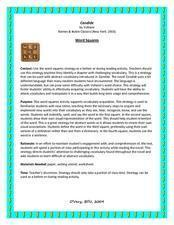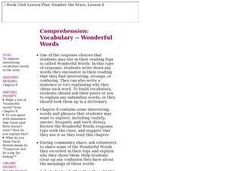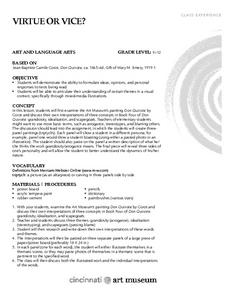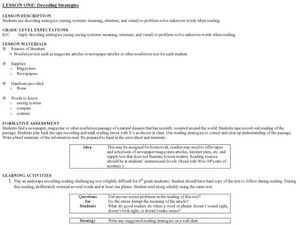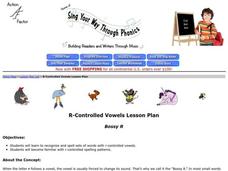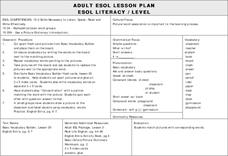Curated OER
Ivan the Fool: Lesson 1
Learners read and analyze a classic Eastern European folktale. In partners, they read the story, take notes, define vocabulary terms, and write a summary of the folktale.
Curated OER
Children's Books Teach Diversity, Respect
Students compare aspects of children's books that teach diversity and respect. They examine universal values such as courage and bravery, respect and apathy. They create a final project based on their ability to recognize the values in...
Curated OER
Palms and Literature
Learners read and analyze the Civil War novel, 'Charley Skedaddle.' They define key vocabulary terms, develop a story map, create a concept web for a character, and take vocabulary tests.
Curated OER
Bueno Brothers' Bean Dip
Learners play a game in which they see how many words they can form from a scoop of lima bean letters
Curated OER
Re-Name That Tune: A Vocabulary Activity
Students build vocabulary skills by rewriting the names of some popular holiday songs, and create a fun "Holiday Tune" bulletin board display.
Curated OER
Writing: Narrative, Expository, Persuasive, and Descriptive
If you are interested in having a basic framework for teaching expository, narrative, persuasive, and descriptive writing, this resource may help; however, you will have to find information on the different forms of writing to share with...
Curated OER
Women Call Out: The Personal Narrative
After reading and discussing several personal narratives written by women in the 1920's, class members write a personal narrative of their own about a time in their lives they felt controlled. Sample narratives can be accessed through...
Curated OER
Candide: Word Squares
Readers of Voltaire’s satire create a word square for vocabulary drawn from Candide. The first box contains the word, the second a picture or illustration of the word. The definition is written in the third box, and learners write a...
Curated OER
Feelings From A to Z
Third graders create a class A to Z Feelings book to explore emotions, discover new words, pose for a "feeling" icture, and write about the feeling.
Curated OER
Connotation in Propaganda
High schoolers assess persuasive techniques in propaganda. They identify and critique rhetorical devices in primary source documents (sources are not specified, but links to sites that contain various documents are included). Groups make...
Curated OER
Synthesis of Information
Locating and synthesizing information is an essential part of the research process but can be overwhelming for many young writers. Eliminate some of the stress and confusion, this resource suggests, by separating these steps. To focus...
Curated OER
Combining Syllables to Form 2- and 3-Syllable Words
Students practice combining consonant-vowel-consonant sounds to form words. They read closed and silent "e" syllables. Students construct two-syllable words. They arrange syllables to form three and four syllable words.
Curated OER
Comprehension: Vocabulary - Wonderful Words
While reading Chapter 8 of Number the Stars, learners write down any words they encounter in their reading that they find interesting, strange, or confusing. They record why they chose each word, and after completing the reading...
Curated OER
Dreams, Stars, and Beaches
Compare and contrast ideas, hopes and dreams with those of Cassie in Faith Ringgold's, Tar Beach. your students can entries in their journals expressing their ideas.
Curated OER
Virtue Or Vice?
Students create triptychs, pictures in three panels side by side, of certain themes displayed in the painting "Don Quixote" by Jean-Baptiste Camile Carot. Student evaluations are accomplished through participation during in-class...
Curated OER
Literary Elements in Of Mice and Men
Ninth graders review an exercise, after reading most of the novel Of Mice and Men by John Steinbeck. They demonstrate a range of literary elements such as conflict, symbolism, setting, and foreshadowing. Students also are able to provide...
Curated OER
Lesson One: Decoding Strategies
Review decoding strategies to read a chosen text. Readers tape themselves reading out loud, listen to the recording, and mark where they have misread words or phrases. They then discuss which words were misread and review how to correct...
Curated OER
The Game of Persuasion
Why is it so important to learn the art of persuasion? Being persuasive helps you acquire the things you want or the things you feel are necessary. Print out these scenarios and assign one to each group of high schoolers. As a team, they...
Curated OER
Growing Poems
Students write garden inspired poetry. In this poetry lesson plan, students go out into the garden and write poems about how they feel, what they see, and what is going on in the garden.
Curated OER
Sing Your Way Through Phonics Lesson Plan
Students recognize and spell sets of words with r-controlled vowels. They become familiar with r-controlled spelling patterns.
Curated OER
Vocabulary Charts
Seventh graders are introduced to the vocabulary associated with archeology. Using a dictionary, they practice finding the meaning of various words and create sentences. They also identify an appropriate use of the word and draw an...
Curated OER
ADULT ESOL LESSON PLAN--Skills Necessary to Listen, Speak, Read and Write Effectively
Students practice alphabetizing basic word groups (classroom, playground, etc.) with flash cards and a Picture Dictionary. They realize the importance of communication correctly with others through picture/word association.
Curated OER
Look It Up!
Sixth graders improve their writing skills by finding, defining, and correctly using new and interesting vocabulary words. Groups of students work together to find, define, and use in sentences ten words with which they are all unfamiliar.
Curated OER
A is for Aardvark
Young scholars work toward the mastery of the art of reading, kids should collect words the way they collect baseball cards or Beanie Babies. Few learning tools are as powerful as a personal dictionary that a child can create, add to,...







